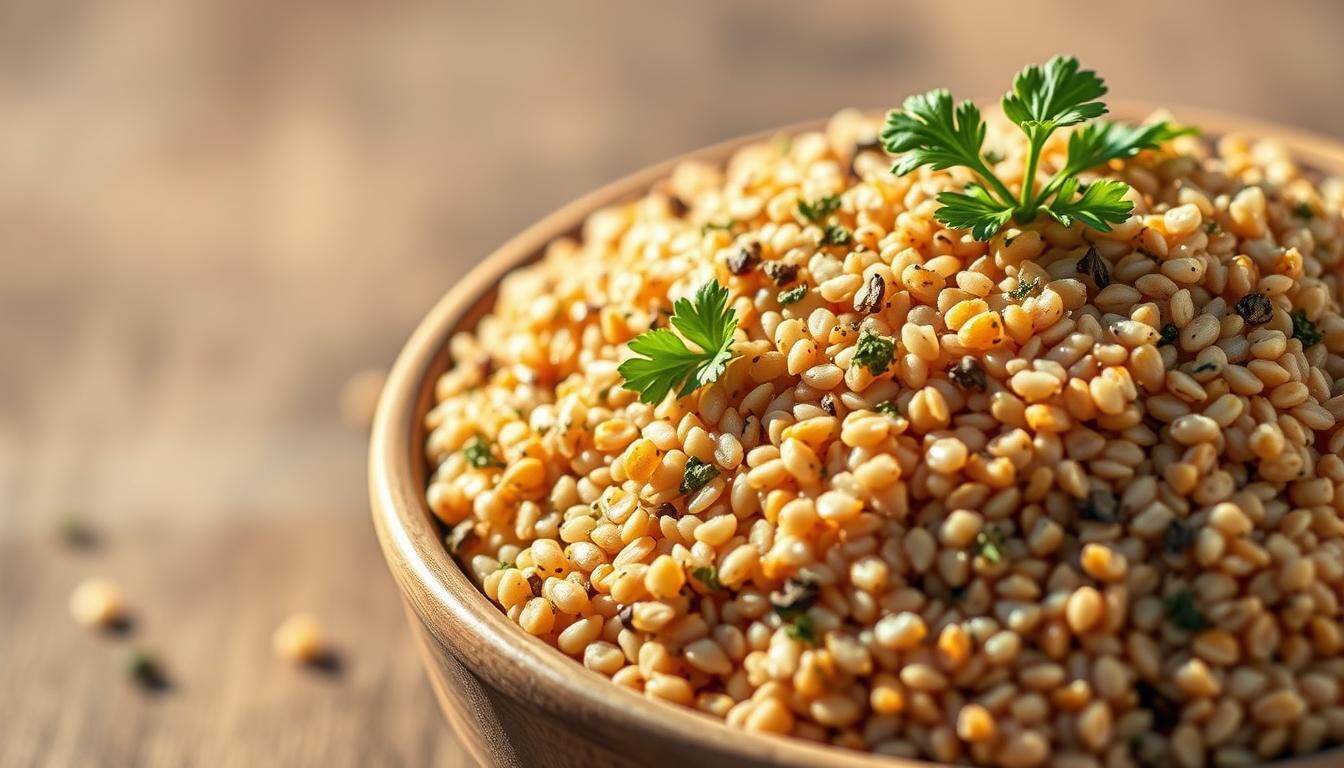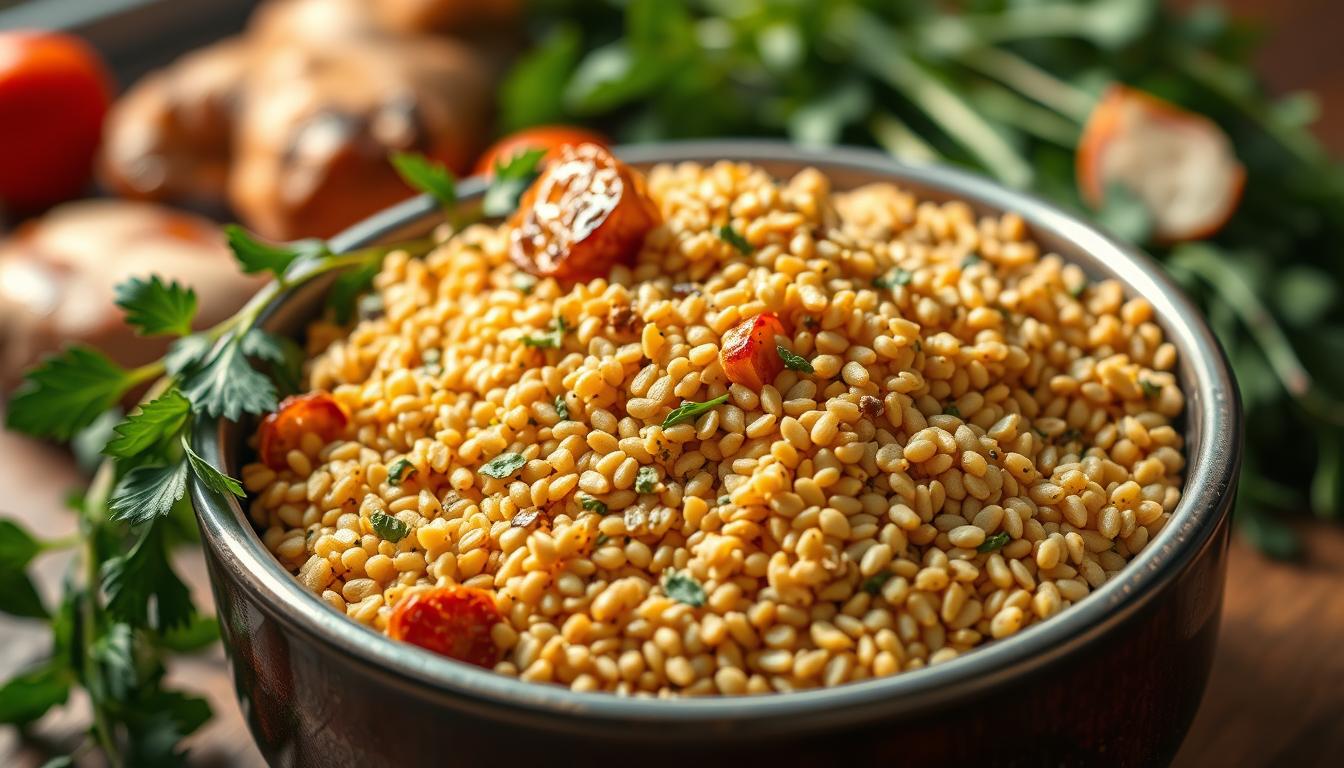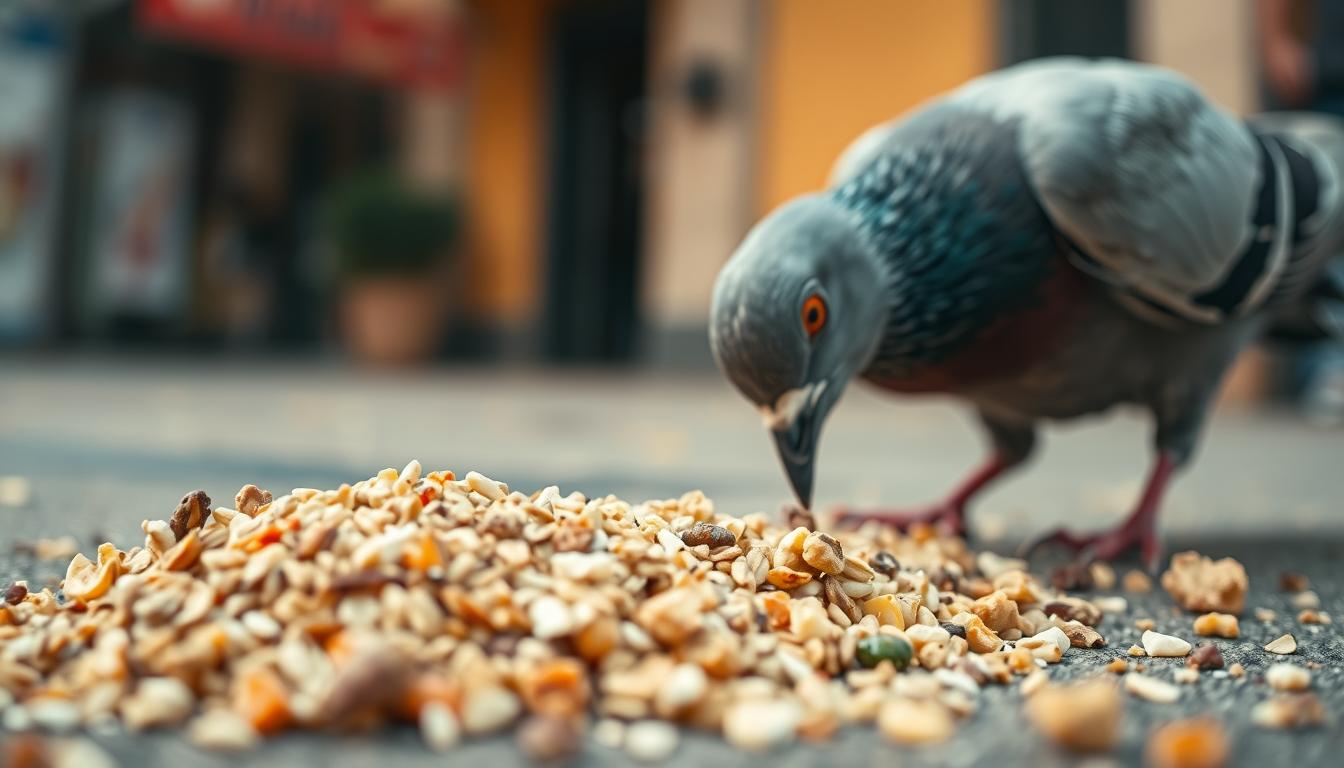Ever wondered about the romantic side of pigeons? These feathered friends have a world of love and commitment that might surprise you. They are true relationship goals when it comes to pigeon mating habits!
Pigeons are known as one of the most monogamous bird species. Their dedication to their partners goes beyond survival. Unlike many animals, they form deep, lasting bonds that can last a lifetime.
Exploring pigeon mating habits reveals a remarkable story of avian romance. They have intricate courtship rituals and share parenting responsibilities. Their commitment is stronger than many human relationships.
Most wild pigeons live 3 to 5 years, while pet pigeons can live up to 15 years. This long time together helps them form incredibly strong pair bonds. These bonds are both touching and scientifically fascinating.
Get ready to dive into the world of pigeon love. We’ll uncover five adorable facts that show how loyal these winged companions can be!
Table of Contents
Understanding Pigeon Courtship Behavior
Pigeons have a world of romance that’s more than just bird behavior. Their courtship shows the complex social side of bird mating.
Finding a mate is a big deal for pigeons. They show off in unique ways to attract and bond with their mates. This ensures they can reproduce well.
Courtship Rituals and Displays
Male pigeons do cool things to get a female’s attention. They:
- Puff out their chest feathers
- Walk with big, showy steps
- Give her nesting stuff
- Do dance-like moves together
The Role of Cooing and Body Language
Cooing is key in pigeon talk. Males use sounds to:
- Get a mate’s interest
- Mark their territory
- Show their feelings
- Signal they’re ready to breed
Initial Bonding Period
The first time they bond is very important. Research shows courtship can take weeks. They check if they’re a good match through behavior.
By six months, pigeons are ready to find a mate for life. They can recognize and stay with one mate. This shows how strong their social bonds are.
Do Pigeons Mate for Life? The Truth About Their Commitment
Pigeons are amazing birds known for their lifelong partnerships. They show a strong commitment to each other, unlike many other species. This makes their relationships truly special.
These birds do more than just live together. They bond through shared activities and communication:
- Shared nest-building activities
- Mutual grooming rituals
- Complex communication through cooing
- Joint parental responsibilities
Pigeons are very dedicated to their mates. Infidelities are extremely rare in their world. Most pairs stay together for many years, often raising multiple broods together.
Genetic studies show pigeons can have up to six broods a year. This requires a lot of teamwork from the pair. Their ability to work together makes them true champions of avian partnership.
Learning about pigeon relationships is fascinating. It shows that love and loyalty are not just for humans. They can be found in the natural world, in unexpected places.
The Remarkable Parenting Partnership of Pigeons
Pigeon breeding biology shows an amazing way of parenting. It makes these birds stand out in the bird world. Their mating systems are a team effort between male and female partners from start to finish.
Pigeons show a strong commitment to raising their young. They use a special shared parenting method. This is clear in how they work together to help their offspring survive.
Shared Incubation Duties
Male and female pigeons both play key roles in egg incubation. They take turns sitting on the eggs. The male does daytime, and the female does nighttime. This way, the eggs stay warm and safe all the time.
Caring for Squabs Together
- Both parents produce crop milk to feed their young
- They take turns feeding and protecting the squabs
- Shared feeding ensures optimal nutrition for developing chicks
Teaching Young Ones to Fly
As the squabs grow, both parents teach them to fly. They show flying techniques and encourage independence. They also protect their young during this important learning time. This teamwork strengthens their bond and helps the young ones survive.
Learning about these parenting dynamics gives us a peek into the complex world of pigeon reproduction and social behavior.
Life Expectancy of Mated Pigeon Pairs
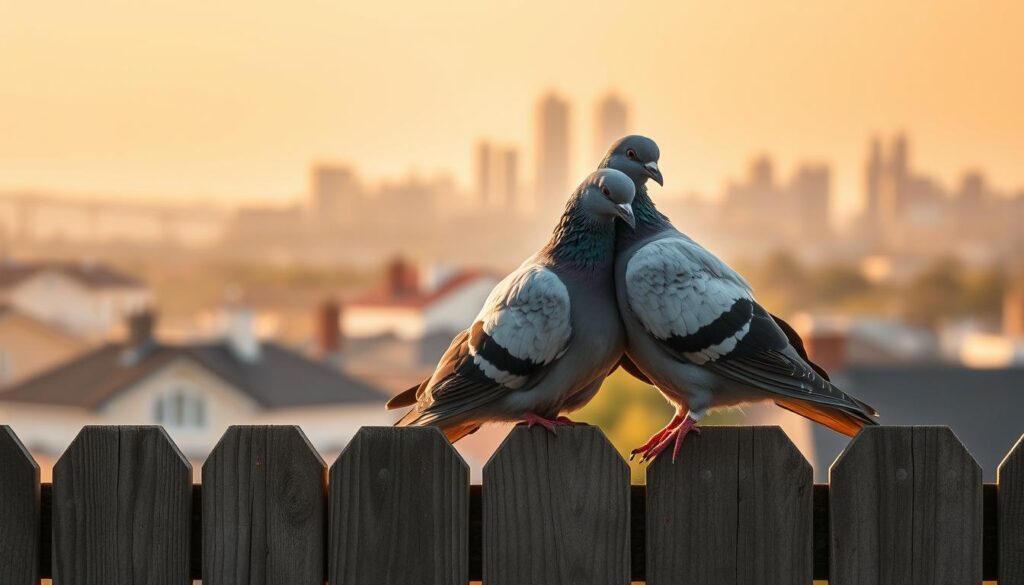
Exploring pigeon mating habits shows us how long these birds live. Domestic pigeons can live up to 15 years. This means they can form lifelong bonds with their mates.
Several factors can affect how long a pigeon lives:
- Diet quality
- Environmental conditions
- Breeding health
- Predation risks
Wild pigeons usually live 6 to 10 years. But, domestic pigeons can live longer if they are well cared for. This allows them to build strong bonds with their mates. They can raise many broods together and support each other through life.
Pigeons can lay up to 12 eggs a year until they are about 6 years old. Their ability to reproduce helps their population grow. There are about 400 million pigeons worldwide, living in both cities and countryside.
If a pigeon’s mate dies, it will find a new partner. This shows their ability to adapt while staying committed to their pair bond. Their way of facing life’s challenges together is truly remarkable.
The Science Behind Pigeon Pair Bonding
Pigeons show us how complex animal relationships can be. They form long-term bonds that go beyond simple instinct. This reveals deep biological processes behind their unique mating systems.
The study of bird mating systems offers interesting views on pigeon partnerships. Researchers found several key factors that help pigeons form strong bonds:
Hormonal Influences on Pair Formation
Hormones like oxytocin and vasopressin are crucial for pigeon bonding. They trigger deep responses in the brain that help pigeons recognize and bond with each other. These hormones are key to pigeons:
- Finding potential mates
- Creating lasting connections
- Keeping their relationships strong
Neural Mechanisms of Social Recognition
Pigeons have advanced brain networks for social recognition. Studies show that over 90% of pigeon pairs stay together for life. This highlights the power of their brain’s bonding abilities.
Social and Environmental Factors
The environment also plays a big role in pigeon bonding. Things like food, territory, and population density affect their choices and relationships. These external factors work with their biology to shape their mating behaviors.
Exploring these scientific aspects gives us a deep look into pigeon relationships. It shows their remarkable commitment to their partners.
Nesting Habits and Territory Defense
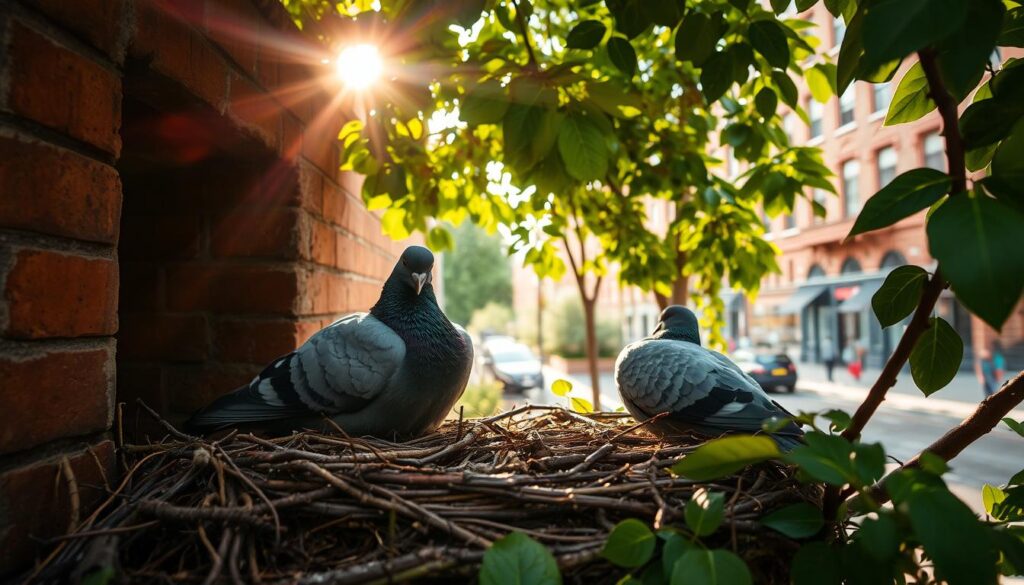
Pigeons are amazing in how they nest and defend their territory. Their breeding habits show a strong commitment to their homes. These birds are very dedicated to their nesting sites.
When picking a territory, pigeons look for safety and a good location. They usually choose places that:
- Keep them safe from predators
- Are close to food
- Protect them from bad weather
- Have a high spot with a good view
In their mating habits, both male and female pigeons work together to build and guard their nest. They use twigs, grass, and other materials to make a strong nest. This teamwork strengthens their bond and keeps their home safe for their young.
Defending their territory is key to their reproductive success. Pigeons will chase away intruders, using sounds and body language to keep their nesting area safe. They are very protective during breeding seasons, keeping their eggs and squabs safe.
Urban pigeons have learned to nest in human-made spaces. They often pick ledges, rooftops, and crevices in buildings. This shows their ability to adapt and survive in new environments.
How Pigeons Choose Their Life Partners
Pigeons have a unique way of picking their lifelong mates. Their mating habits show a detailed process that’s not just random. Unlike many birds, pigeons spend a lot of time choosing the right partner.
Learning about their mating systems is really interesting. It shows how pigeons form strong bonds. Their courtship rituals are complex, helping them pick the best mate.
Critical Selection Factors
Pigeons look at several things when picking a mate:
- Physical health and genetic fitness
- Strength and ability to defend territory
- Demonstrated nurturing capabilities
- Successful previous breeding experiences
Age and Compatibility Considerations
Pigeons usually choose mates close to their age. Young ones often pair with older, more experienced birds. This helps with successful breeding and nest care.
Behavioral Evaluation Process
Their courtship rituals are detailed. They let potential partners check each other out. This includes:
- Synchronized movements
- Intricate cooing patterns
- Mutual preening
- Territory sharing demonstrations
Through these rituals, pigeons increase their chances of successful breeding. They also strengthen their pair bonds for the long term.
Surviving Loss: What Happens When a Mate Dies
When a pigeon loses its lifelong partner, it grieves deeply. These birds form strong emotional bonds, making loss hard. They show great strength in facing grief and possibly finding new love.
After losing a mate, pigeons show changes in behavior. They might:
- Interact less with others
- Speak less
- Stay away from their group
- Fly differently
Even though pigeon pairs are very loyal, they don’t stay alone forever. They go through a healing process and might find a new partner. Young pigeons tend to find love again faster, while older ones might take longer.
Finding a new partner is a careful choice. Pigeons look at:
- Physical match
- Living close by
- Sharing food
- Good chances of having babies
Nature has given these amazing birds a way to get over loss and keep their species alive.
Conclusion
Exploring pigeons shows us a story of deep commitment and connection. Do pigeons mate for life? Yes, they do, and it’s quite remarkable. With over 250 species, pigeons show us how they bond and reproduce in amazing ways.
Pigeons don’t just mate; they form strong bonds. They spend a lot of time together, sharing duties and caring for their young. Their way of communicating and supporting each other is truly unique.
Learning about pigeon partnerships is fascinating. It shows us how birds form lasting bonds and work together. From the rock dove to tropical species, pigeons prove that love and commitment are not just for humans.
Studying pigeons helps us appreciate their social intelligence and emotions. Their ability to keep strong relationships is inspiring. It reminds us of the complex social networks in nature, making us see pigeons in a new light.
FAQ
Do pigeons really mate for life?
Pigeons often form long-term monogamous partnerships. These can last for many years. Many pairs stay together for their entire breeding cycle and potentially for life. They show a high level of commitment, unlike many other bird species.
How do pigeons choose their mates?
Pigeons choose mates through complex courtship behaviors. They use cooing sounds, elaborate displays, and body language. They look at physical characteristics, compatibility, and traits that suggest genetic fitness and ability to raise offspring.
What happens if a pigeon loses its mate?
If a pigeon loses its partner, it may go through a mourning period. It will then seek a new mate. The grieving process can involve behavioral changes. But most pigeons will find a new partner to continue their reproductive cycle.
How do pigeons share parenting responsibilities?
Pigeon pairs are remarkable co-parents. Both males and females share duties like incubating eggs, feeding squabs, and teaching young pigeons to fly. They alternate responsibilities and work together to ensure their offspring’s survival and success.
How long do pigeon partnerships typically last?
Pigeon partnerships can last several breeding seasons or even their entire lifespan. This lifespan is typically 3-15 years in the wild. Environment, diet, and health can influence how long their relationship lasts.
Do all pigeon species exhibit the same mating behavior?
While most pigeon species show strong monogamous tendencies, specific mating behaviors can vary. This depends on the species, environment, and individual circumstances. However, loyalty and shared parenting are common across many pigeon varieties.
How do hormones influence pigeon pair bonding?
Hormones like oxytocin and vasopressin are crucial in pigeon pair bonding. They facilitate social recognition, attachment, and cooperative behaviors. These biological mechanisms help pigeons form and maintain strong, long-term reproductive partnerships.
What role does territory play in pigeon mating?
Territory is very important in pigeon mating. Pairs carefully select and defend nesting sites. Successful territory selection and maintenance show a pair’s ability to provide a safe, stable environment for raising offspring.
Source Links
- Unveiling the Lifespan of Pet Pigeons: A Comprehensive Guide – https://dtermination.com/how-long-do-pet-pigeons-live/
- Blog – Page 2 of 41 – – https://www.pigeonrescue.org/blog/page/2/
- Pigeon Nesting Habits and Behavior: An In-depth Look – https://birdfact.com/articles/pigeon-nesting
- Pigeons in Florida | Pigeon Identification, Habits & Behaviour – https://www.flapest.com/pest-info/birds/pigeon/
- Reproductive behaviour – Courtship, Mating, Parenting | Britannica – https://www.britannica.com/science/reproductive-behaviour-zoology/Courtship
- Understanding and Protecting Pigeons and Knowing Their History – https://animalcharityevaluators.org/blog/understanding-protecting-pigeons/
- Which Animals Are Monogamous Rather Than Mating For Life? – https://sentientmedia.org/animals-that-mate-for-life/
- OvoControl P | Pigeon Birth Control | OvoControl Pigeon Birth Control – https://pigeoncontrolphoenixaz.com/services/ovocontrol/
- Why You Should Appreciate Pigeons. Yes, Pigeons. – https://www.massaudubon.org/news/latest/why-you-should-appreciate-pigeons
- What you never knew about pigeons – https://www.cbsnews.com/news/what-you-never-knew-about-pigeons/
- Fascinating Pigeon Facts and Figures: 2024 Insights – https://www.ovocontrol.com/pigeon-facts-figures?srsltid=AfmBOopC6Wm6aULLxqfSNji5HrnFXzQZ5kgU8uplPE-G1MO6GmqOGwBN
- Why Do You Never See a Baby Pigeon? – https://www.birdsandblooms.com/birding/attracting-birds/bird-nesting/baby-pigeon/?srsltid=AfmBOoqzT2AlhZJvq6k_axegrYnlgNQ85fCkdVA8kcG8zUq4U7po981f
- do pigeons mate for life – https://www.mooncafealcona.ca/imgen452/do-pigeons-mate-for-life
- Palomacy Pigeon & Dove Adoptions – https://www.pigeonrescue.org/
- Reproductive behaviour – Courtship, Nesting, Mating | Britannica – https://www.britannica.com/science/reproductive-behaviour-zoology/Birds
- Sexual selection in birds – https://en.wikipedia.org/wiki/Sexual_selection_in_birds
- Cavity Nesting Birds: All You Need To Know – https://www.birdfy.com/blogs/blogs/cavity-nesting-birds-all-you-need-to-know?srsltid=AfmBOoqYTTKaHzg_5GTFZtRVgPlifaN6i1vjVI8BJPGxP4UNTysrV508
- Ethogram of the Pigeon – Great Lakes Pigeon Rescue – https://greatlakespigeonrescue.org/ethogram-of-the-pigeon/
- 10 facts about pigeons – friends or vermin? – https://www.animalfriends.co.uk/save-animals-with-us/tails-of-uk-wildlife/tails-of-uk-wildlife-blogs/10-facts-about-pigeons—friends-or-vermin/
- Domestic pigeon – https://en.wikipedia.org/wiki/Domestic_pigeon
- Why Do You Never See a Baby Pigeon? – https://www.birdsandblooms.com/birding/attracting-birds/bird-nesting/baby-pigeon/?srsltid=AfmBOopp8Uti5JhkGPCOaNYIb2365-eJ4iaQH0D1x_ep_JVHCzyyQVbd
- Grieving the Passenger Pigeon Into Existence Again – https://thereader.mitpress.mit.edu/grieving-the-passenger-pigeon-into-existence-again/
- Feral pigeon – https://en.wikipedia.org/wiki/Feral_pigeon
- Pigeon | Bird of Prey, Flight & Migration Patterns | Britannica – https://www.britannica.com/animal/pigeon
- Homing Pigeons: A Fascinating History and Impact on Human Life – https://teketrek.net/en/homing-pigeons-a-fascinating-history/


